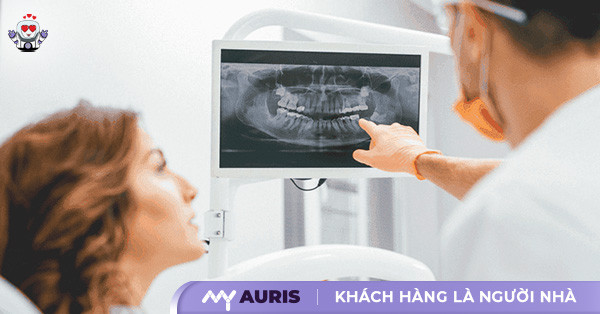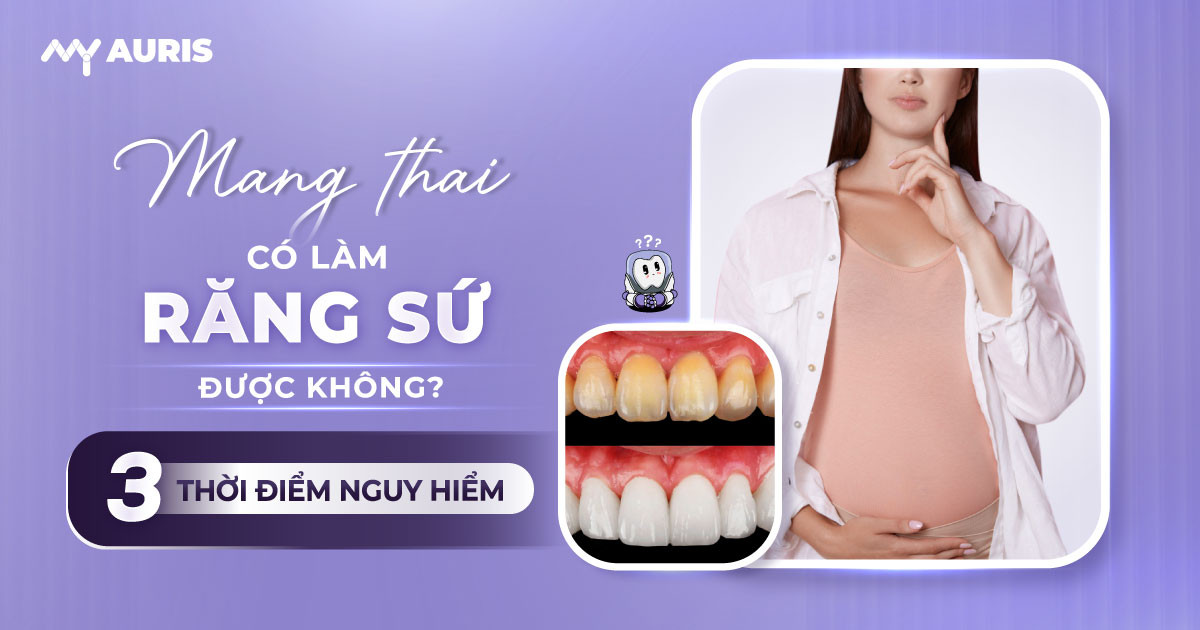Is it safe for pregnant women to get dental crowns? This is a common question for many expectant mothers with dental problems. According to experts, pregnant women can still get dental crowns if it’s done at the right time – especially during the second trimester, when the pregnancy is stable and dental anesthesia can be safely controlled. To ensure safety, pregnant women should visit a reputable facility like My Auris Dental Clinic. The dentist will conduct a general dental examination, assess the pregnancy’s health, and determine the appropriate time for the procedure.
Can Pregnant Women Get Dental Crowns?
According to cosmetic dental experts, pregnant women can get dental crowns, but certain conditions regarding timing, methods, and medical indications must be followed. Getting dental crowns is not a major surgical procedure, but it still requires dental anesthesia, tooth preparation, and can affect pregnancy health if not done correctly.
Pregnant women can absolutely get dental crowns if the procedure is performed during the safe period – the second trimester. During this stage, the fetus is stable, and the mother has a lower risk of premature birth or sensitivity to anesthetics. However, a comprehensive health check-up, including blood pressure, cardiovascular health, and pregnancy history, must be conducted before proceeding.
The first three months (first trimester) are a critical period when the fetus’s organs are forming and are sensitive to any medical intervention, including dental anesthesia. The final trimester, on the other hand, carries the risk of premature birth, and the mother may easily become tired or stressed if sitting for too long or experiencing pain. Therefore, intervention should only be done if absolutely necessary, not for cosmetic reasons.

Potential Risks of Getting Dental Crowns During Pregnancy
Getting dental crowns during pregnancy is not simple; if you don’t fully understand the potential risks, you could unintentionally affect the health of your fetus and yourself.
Dental Anesthesia May Affect the Fetus
When getting dental crowns, the procedure often requires the use of dental anesthesia. Although some types, like lidocaine, are considered safe when used in correct doses, there is still a possibility that the medication could affect the fetal nervous system if not administered carefully. Anesthetic reactions during pregnancy can cause uterine contractions, reduced blood flow to the fetus, or increased maternal heart rate. Pregnant women with sensitive constitutions are also prone to dizziness, tremors, or low blood pressure when anesthetized.
Allergies and Reactions to Porcelain Materials
Some types of dental porcelain may not be compatible with the mother’s body, especially when hormonal changes are erratic during pregnancy. Allergies to dental crown materials – particularly metal-ceramic crowns – can cause gingivitis, oral mucosa irritation, and lead to infections in the tooth and gum area. Zirconia crowns are considered safer, but pre-procedure checks are still necessary.
Risk of Gum Infection During the Procedure
When performing a dental crown procedure, the dentist will need to prepare the tooth and intervene deeply into the natural tooth structure. If absolute sterility is not maintained, pregnant women could develop gum infections or prolonged bleeding. These conditions increase the risk of impacting the pregnancy, especially given that the immune system of pregnant women is naturally weaker than usual.
Psychological Stress and Pain Indirectly Affect the Fetus
Pregnant women are more sensitive to pain than non-pregnant individuals. The process of tooth preparation, impression taking, and crown placement can cause discomfort and psychological stress. Prolonged muscle tension and stress increase cortisol hormone levels, which can negatively affect fetal development, increasing the risk of premature birth or low birth weight.
Risks from Choosing the Wrong Time During Pregnancy
Getting dental crowns during the first trimester (first 3 months) or the final trimester (last 3 months) is not recommended. The early stage is when the fetus is forming and is very sensitive to chemicals and medical interventions. In contrast, the final stage can easily lead to premature labor if the pregnant woman experiences a lot of pain or has to lie on the dental chair for a long time. The most suitable time for the procedure is the second trimester, when the fetus is stable and the mother is strong enough to withstand minor procedures.
Damage to Natural Enamel if Technique is Incorrect
During the dental crown procedure, if the dentist lacks experience, they might grind too deeply into the natural tooth structure. This weakens the tooth, making it prone to prolonged sensitivity or future pulp inflammation. Especially for pregnant women – who cannot use strong anti-inflammatory or pain-relieving medications – complications will be difficult to control.
Difficulty Adjusting if Problems Arise After the Procedure
After getting dental crowns, if complications such as ill-fitting crowns, cement failure, or gum inflammation occur, re-treatment during pregnancy is very limited. Many doctors will avoid further intervention and wait until after childbirth to make adjustments. This can cause pregnant women to endure pain or difficulty chewing for many months.

Which Trimester is Safest for Dental Crown Procedures?
Can pregnant women get dental crowns? The second trimester is the safest time for pregnant women to get dental crowns. This stage lasts from week 13 to week 27 of pregnancy. During this time, the fetus has developed stably, major organs have formed, and the risk of miscarriage is lower compared to the first trimester. Furthermore, the mother’s body has gradually adapted to pregnancy, reducing morning sickness, which helps the dental treatment process proceed more easily.
In contrast, the first trimester (first 3 months) is not an appropriate time for dental procedures like getting dental crowns, because at this stage, the fetus is forming important internal organs. Any intervention such as dental anesthesia, psychological stress, or minor infection can negatively affect the fetus. Additionally, pregnant women often experience severe nausea and fatigue, making prolonged interventions unsuitable.
The last three months of pregnancy (third trimester) are also not an ideal choice. With a larger abdomen, sitting for a long time during dental work can cause discomfort. Blood vessels in the abdominal area can be compressed when lying on the back for too long, easily leading to low blood pressure. Pregnant women at this stage are also prone to swelling and back pain, making prolonged dental procedures a physical burden.
What Should Pregnant Women Note if They Need Dental Crowns?
Getting dental crowns is a cosmetic dental procedure that helps restore function and improve the appearance of teeth. However, for pregnant women, all medical interventions, even minor ones like dental treatment, require careful consideration. If a pregnant woman is experiencing serious dental problems and intends to get dental crowns, she needs to keep in mind some important points below to ensure the safety of both mother and fetus:
Determine the Right Time for the Procedure
Pregnant women should not get dental crowns during the first trimester. This is the stage when the fetus’s vital organs are forming, making it susceptible to any medical intervention. If necessary, choose to get dental work done in the second trimester – a period considered safer because the fetus is stable, and the mother experiences less morning sickness. Avoid getting crowns in the last three months due to the risk of premature labor from lying on the dental chair for extended periods.
Consult an Obstetrician Beforehand
Before making a decision, pregnant women should have a comprehensive health check-up by an obstetrician to assess the safety level if dental treatment is performed. Cases involving high blood pressure, gestational diabetes, or a history of premature birth are often advised to postpone dental crown procedures until after delivery.
Choose a Dental Clinic and Dentist Experienced with Pregnant Patients
Not all dentists have experience treating pregnant women. Pregnant patients should choose a reputable clinic with dentists who understand the specifics of pregnancy health and know how to handle adverse reactions during dental work. The dentist should inform the patient in advance about the procedure steps, the type of medication to be used, and the level of pain, if any.
Be Cautious with Dental Anesthesia
Dental crowning often requires anesthesia. Some dental anesthetics like low-dose Lidocaine can be used during pregnancy if explicitly prescribed by a doctor. However, the dosage must be strictly controlled to avoid affecting the fetus. Do not self-request anesthesia or use over-the-counter pain relievers.
Choose Safe Dental Crown Materials
Pregnant women should choose zirconia dental crowns – one of the highly safe materials that rarely cause allergies. Additionally, it’s advisable to limit choices to metal-ceramic crowns or those containing nickel, as they may cause adverse reactions. The dentist will examine the tooth condition and recommend the most suitable type for each individual.
Limit the Number of Appointments and Time in the Dental Chair
Pregnant women should not have too many appointments or lie in the treatment chair for too long. A dental crown procedure should be divided into short sessions, each lasting about 30–45 minutes, to avoid dizziness and low blood pressure from lying on the back for extended periods. On average, 2–3 appointments are needed to complete the process.
Ensure Suitable Oral Health Before the Procedure
Dental crowns should only be placed when there is no gum inflammation, no ongoing root canal treatment, or no severe enamel problems. If teeth are weak or inflamed, it’s best to treat these issues thoroughly first before considering cosmetic procedures. This helps reduce the risk of affecting the pregnancy due to widespread dental infection.
Proper Post-Procedure Dental Care
After getting dental crowns, pregnant women should eat soft foods and avoid items that are too hot or too cold. Practice gentle oral hygiene with a soft-bristled toothbrush and alcohol-free mouthwash. Follow up with scheduled appointments to monitor progress. If there are signs of prolonged pain, inform the doctor immediately for timely intervention.
Always Prioritize Mother and Baby’s Health
Finally, if the purpose of getting dental crowns is purely cosmetic, pregnant women should consider postponing it until after childbirth. At that time, all dental treatments will be more comfortable, less risky, and not limited by medication. In all cases, prioritize oral health and consult with a medical professional before making any decisions.

Should Dental Crowning Be Postponed Until After Childbirth?
Postponing dental crowning until after childbirth is an option recommended by many experts if the dental condition is not urgent. In compulsory cases, pregnant women should have the procedure done during the second trimester – the period considered safest if medical intervention like dental anesthesia is required. There must be a clear indication from an experienced dentist and close coordination with an obstetrician.
Pregnant women should consider postponing dental crowning if the reason is cosmetic and not immediately necessary. In the first trimester, the fetus’s nervous system is rapidly developing, and any factor causing stress, anxiety, or drug exposure can pose a risk. In the final stage of pregnancy, lying in the dental chair for a long time is also not easy, not to mention that even minor pain can induce premature labor.
If there are no severe problems such as intense pain, severe inflammation, or infection, dental crowning can be postponed until after childbirth. After delivery, the mother’s body is more stable, cosmetic dental interventions are easier to control, and there’s no worry about the effects of anesthetics or psychological stress impacting the pregnancy.
If a tooth is significantly chipped, causes discomfort, obstructs chewing, or carries a risk of acute pulpitis, the dentist may recommend early intervention to prevent the spread of infection, which could affect the health of both mother and baby. In such cases, measures like temporary fillings or minor treatments with non-anesthetic materials are prioritized to minimize risks.
Many dental clinics now offer dental crown treatments using safe Zirconia materials, combined with low-dose anesthetics like Lidocaine – which is permitted during pregnancy under professional supervision. However, pregnant women need to have their pregnancy history, blood pressure, and drug reactions thoroughly assessed before the procedure.
After childbirth, mothers should wait for their body to recover stably (usually after 2-3 months), combined with a general dental check-up to determine the appropriate time for dental crowning. This ensures both aesthetic effectiveness and avoids psychological stress during a sensitive period.





